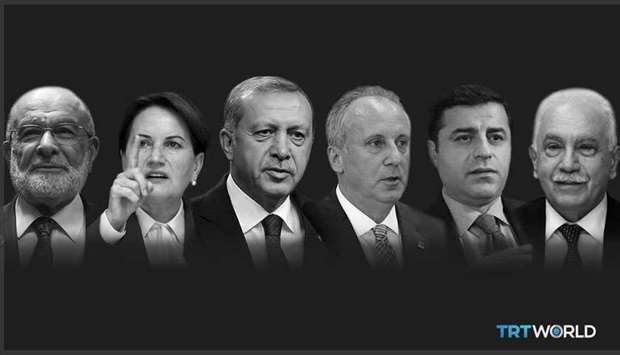All campaigning and opinion broadcasts ahead of Sunday’s Turkish parliamentary and presidential elections ended as of 6pm Saturday.
Some 56,322,632 registered voters will be heading to the polls widely viewed as the most crucial in Turkey for decades.
The winner of Sunday's presidential contest will acquire sweeping new executive powers under a constitutional overhaul backed by incumbent president Tayyip Erdogan and endorsed last year by a narrow majority in a referendum.
Erdogan, who has dominated Turkish politics for 15 years, first as prime minister and since 2014 as president, praised the executive presidency that comes into force after the election.
"God willing, Turkey will start flying with this system... With this system, we will achieve what others cannot imagine," he told tens of thousands of supporters at a rally in Istanbul's Esenyurt district.
Erdogan, 64, also promised to deliver more of the big infrastructure projects that have characterised his time in power and helped make him the most popular leader of modern Turkish history.
His supporters say only Erdogan can guarantee Turkey's economic and political stability in difficult times.
"Stability is important above all else, I believe after we shift to the new system certain decisions will be taken much more swiftly. The economy will be stronger," said Mehmet Engin, 52, a furniture wholesaler, attending Erdogan's rally.
Muharrem Ince, a former teacher and the presidential candidate of the main opposition party, the secularist Republican People's Party (CHP), has proved highly effective on the campaign trail, drawing huge crowds, especially in the big cities.
Voters will cast two separate ballot papers in the same envelope, one for the presidential and the other for parliamentary elections.
After the voting ends, ballots cast for the presidential candidates will be counted first.
Voting at the customs gates, which started on June 7, will also end at 5pm Sunday.
Turkish expatriates in several Middle Eastern countries cast their ballots on Saturday.
Eight political parties are participating in the parliamentary elections that include the Justice and Development (AK) Party, the Republican People's Party (CHP), the Nationalist Movement Party (MHP), the Peoples' Democratic Party (HDP), the Free Cause (Huda-Par) Party, the newly formed Good (IYI) Party, the Felicity (Saadet) Party and the Patriotic (Vatan) Party.
Six candidates are running for president: Recep Tayyip Erdogan for the People’s Alliance (Cumhur Ittifaki), formed by Turkey’s governing AK Party and the MHP; Muharrem Ince for CHP; Selahattin Demirtas for HDP; Meral Aksener for the Good (IYI) Party; Temel Karamollaoglu for the Felicity (Saadet) Party and Dogu Perincek for the Patriotic (Vatan) Party.
Turkey's elections will usher in a new era in the country's modern political history. As voters choose members of parliament and a president, the country will move towards a system that will make the president head of both state and government.
Erdogan has served as president since 2014 - Turkey's first popularly elected president. Before that, he served as prime minister from 2003 to 2014.
Should he win Sunday's elections, Erdogan would be Turkey's first leader under the presidential system, which does away with the prime minister's post, among other changes.

